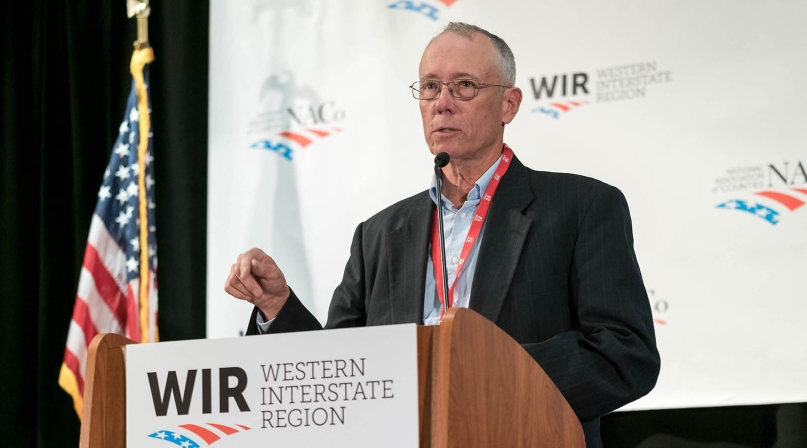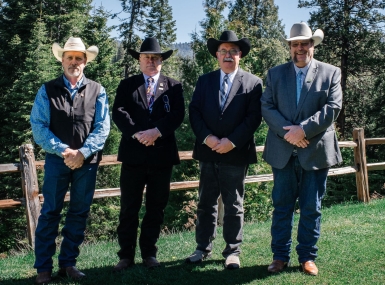Retired Harney County, Ore. judge shares experience from Malheur occupation

Failed recall attempt vindicated Harney County, Ore. judge's handling of refuge occupation
When outside influences pressured his rural community, former Harney County, Ore. Judge Steve Grasty saw the long-standing bonds between residents outlast the anti-government intruders and start bringing life back to normal.
Though he is now retired from county government, Grasty was no less inspired by the local support that carried him and his colleagues when he recounted the occupation at the Western Interstate Region’s General Session audience.
Over the course of 41 days, starting Jan. 2, 2016, anti-government extremists occupied the Malheur National Wildlife Refuge and intimidated residents in the county seat of Burns with a cast of militia members. Ringleader Ammon Bundy called for local control of federal land and fought the incarcerations of two local men who had pled guilty to arson on Bureau of Land Management territory. Though Bundy was acquitted of charges relating to the occupation, Grasty believes the reactions of the people in Harney County spoke louder.
“Maybe the court system failed us,” he said. “They might have not kicked their butts but our community did… Our community pulled together and said we don’t need you, you’re not our solution.
“That was the bedrock behind everything.”
Grasty was honored by WIR as the recipient of the Dale Sowards Award, given annually to the person who has demonstrated outstanding service to public lands counties.
Harney is the 10th largest county in the continental United States by area, and the federal government owns three-quarters of the land. With many federal employees among the residents, the conditions were ripe for Bundy, son of rancher Cliven Bundy who carried on a standoff with Bureau of Land Management officials less than two years prior in Nevada, to stoke anti-government tensions, particularly regarding Western lands.
But, Grasty said, Ammon Bundy lacked his father’s ranching background, and most Harney County locals picked up on his lack of authenticity.
“Ammon Bundy is not a rancher, he’s not a cowboy, he’s a used-parts salesman,” Grasty said. “I don’t know about his dad, but I know Ammon, and he doesn’t ranch.”
Grasty said that an FBI analyst who went to work for the BLM after the Cliven Bundy standoff in Nevada had deduced, from tracking social media, that another conflict was brewing.
“She predicted this, not where not when, but the closer it got to Jan. 2, she was saying it could happen here,” he said. “Her foresight…we should have paid attention to it.”
Grasty met Bundy shortly after he moved to Harney County from Idaho and formed a “Committee of Safety,” a pre-Revolutionary War body that sought to act like a shadow government and replace the County Court, despite representing only 22 of the county’s 4,400 registered voters. He offered Grasty his selective interpretation of the Constitution regarding the arson case, but did not want to hear a counterpoint. He remarked that he initially dismissed the committee’s efforts which he later regretted.
“If someone forms a Committee of Safety in your county, you want to figure out what’s going on,” Grasty said, including who signed it and what groups are represented. Many, including an Oregon legislator, showed up to lend support to the movement.
Soon after that meeting with Grasty, a public rally boiled over as Bundy, his brother Ryan and armed associates occupied the refuge headquarters, outside of town. Grasty and Sheriff David Ward served as the public faces of the county, taking the brunt of animosity from the Bundys and their allies.
With militia members staked out through town and the county courthouse surrounded by a cyclone fence, public meetings got heated, as FBI and allies of the occupiers stared each other down in a high school gymnasium filled with more than 300 people, most of whom were opposed to the occupation, even as Bundy and his supporters tried to pick at the seams between the citizens of the community and the federal government’s presence.
Grasty had seen enough,
“We’re going to have a shootout? In my town?” he said. “Over this ridiculous crazy guy who isn’t a rancher, who undermined many of your values. He undermined our community and to me that was the most intimidating part of the whole thing. To think of having an armed standoff there.”
He warned law enforcement that he was about to “go after” Bundy.
“I turned and walked across the gymnasium floor and I said ‘Mr. Bundy it’s time for you to go home,’” he said. “‘This community has told you over and over they’ve had enough, you made your point. Go home.’”
He offered to drive him out of the state personally, which Bundy declined.
The tension continued, with federal agents unwilling to remove the occupation, and in late January, two parents came to Grastly and said they would remove Bundy if nobody else would.
“That’s not the thing you want to happen,” he said. “I called Gov. Kate Brown and she told me to sit tight. She didn’t say so but I think she knew they were going to take him down that day (in a traffic stop).”
Months after Bundy was arrested, a recall effort against Grasty failed, giving him a larger margin of victory than any prior race he had run. He had decided not to run again long before the occupation, so the recall served mainly to waste more county money, he said.
Grasty credited Association of Oregon Counties Communications Director Laura Cleland with helping him keep his head while national media focused on his corner of Oregon.
“I’m not a professional PR guy, though we play that game pretty often,” he said. “I think the difference between me and President Trump is that I listen to my managers.”
But on a serious note, he praised the help he had from the state association, the state government and the federal congressional delegation.
“It was calming and helpful, and I’ll always be grateful,” he said. “If there’s someone you can turn to out there, don’t forget about them.”
Furthermore, he regretted not being more firm that county staff make use of employee assistance programs.
“These people are not used to going through a metal detector to go to work,” he said. “The more often you deal with events the longer it lasts and the harder it is to recover from this, and we still have courthouse employees who were affected by this stress.”
And in the end, that was what bothered him the most about the occupation and its spillover into Harney County.
“Bundy and his friends undermined some basic values in this community and nation that will take a long time to come back together,” he said. “The principles of WIR figure in there — protecting public lands, find sustainable uses in our communities, and also trying to get ahead of the curve of what became absolutely crazy.
“Our community said ‘We like an open courthouse. We like access to our elected officials. We trust in them.’”
Attachments
Related News
Nebraska counties add new office, new NACo members
The Nebraska Association of County Officials reached out to its more remote members by opening an office in the western part of the state.

NACo WIR submits recommendations for public lands transportation needs
On September 8, NACo’s Western Interstate Region (WIR) submitted comments and recommendations for the U.S. Department of Transportation (USDOT)’s Request for Information to as the agency develops its priorities for the upcoming surface transportation reauthorization bill.

Mariposa County finds third time’s a charm for WIR
The Western Interstate Region made up for lost time during its conference in Mariposa County, Calif., welcoming the state of Nebraska and addressing pressing issues for public lands counties.
